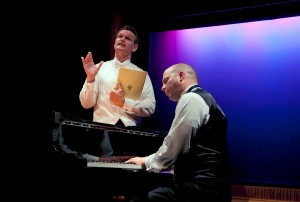Theater Review: “2 Pianos 4 Hands” — One Highly Amusing Evening
Some of the jokes in 2 Pianos 4 Hands reach fairly deep into an understanding of how classical music works and is taught; other jokes will be recognizable to anyone who has taken piano lessons or raised a child to do so.
2 Pianos 4 Hands: A Play With Music byTed Dykstra and Richard Greenblatt. Directed by Gus Kaikkonen. Staged by the Peterborough Players, Peterborough, New Hampshire, through July 21.
By Jim Kates

Tom Frey and Jeffrey Rockwell tickle the ivories and funny bones in 2 PIANOS 4 HANDS. Photo: Deb Porter-Hayes.
When 2 Pianos 4 Hands last played the Peterborough stage back in 2010, I missed the production, so I came to it this time with less familiarity than many in the first-night audience. The anticipatory buzz was genial—in the spirit of Spike Jones, Chico Marx, Victor Borge, Anna Russell, and Peter Schickele, the show makes a broad musical foolery of high culture, situation comedy, and slapstick that not only bears but invites repetition. You want to see it again, not because you will discover new depths in the script or the production but because the initial fun stays funny. And it proved a Peterborough hit the first time around.
Some of the jokes reach fairly deep into an understanding of how classical music works and is taught; other jokes will be recognizable to anyone who has taken piano lessons or raised a child to do so (the only element that seems to be missing is “Für Elise”) and much of the rest of the humor is accessible simply on its own terms. A great deal of the comedy turns on a dissonance between the high cultural level of the musical background and the colloquial intrusion of more pedestrian life. You don’t need to know what a diminished seventh is to enjoy 2 Pianos 4 Hands, but it does help to know the lure of a pick-up hockey game to a kid stuck in a half hour of practicing scales.
The plot, such as it is, follows the education of two aspiring pianists, who happen, coincidentally, to carry the names of the two playwrights—Richard Greenblatt and Ted Dykstra—from childhood through conservatory. A gradual modulation of the beginning ivory-tickling frenzy—well controlled under the direction of Gus Kaikkonen—develops into a rather mellow acceptance of lowered expectations. “I could have played Carnegie Hall,” Ted says wistfully toward the end, after playing a recording of Vladimir Horowitz, but he and the audience know by this time that he could never have been a contender. There’s no spoiler in giving this much away; the predictability of it all is part of the comfort. Indeed, the ending is announced in the program notes, which also let us in on the autobiographical origins of the script.
2 Pianos 4 Hands began in a Canadian workshop, and its structure, one vignette following another with a minimum of connective tissue, is the kind of theater that often grows out of workshop development. In this case, a lot of the binding is provided by the music, for which the two actors, Tom Frey as Ted and Jeffrey Rockwell as Richard, prove themselves indeed “two of the best piano players in the neighborhood.” The playwrights were wise enough also to give the music the last word, and the evening ends not in the ridiculousness with which it began but closer to the sublime.
Frey and Rockwell work together in a Spy v. Spy reciprocity of mutual support, underlined by the black and white of their costumes, incomplete formal concert attire. In addition to their own roles as Ted and Richard, they take on fluidly the roles of the parents and teachers who move through the students’ lives, abetted by a double-staging of two facing pianos and little else except their own versatility. Color comes from an unobtrusive and useful background provided by a a set designed by Steve Lucas with lighting by John Eckert that functions more than usually as a fair visual equivalent of mood music.
Jim Kates is a poet, feature journalist and reviewer, literary translator and the president and co-director of Zephyr Press, a non-profit press that focuses on contemporary works in translation from Russia, Eastern Europe, and Asia. His latest book is Muddy River (Carcanet), a translation of verse by Russian existentialist Sergey Stratanovsky. His translation of Mikhail Yeryomin: Selected Poems 1957-2009 (White Pine Press) won the second Cliff Becker Prize in Translation.

interesting review, thanks. How many contemporary chamber plays are now incorporating live music performance by talented musician/actors? I think back to the one-man Gershwin and Bernstein shows I reviewed last year. This week I see a play based on Tchaikovsky’s relationship with his rich and remote lady patron that includes a trio onstage playing his work.